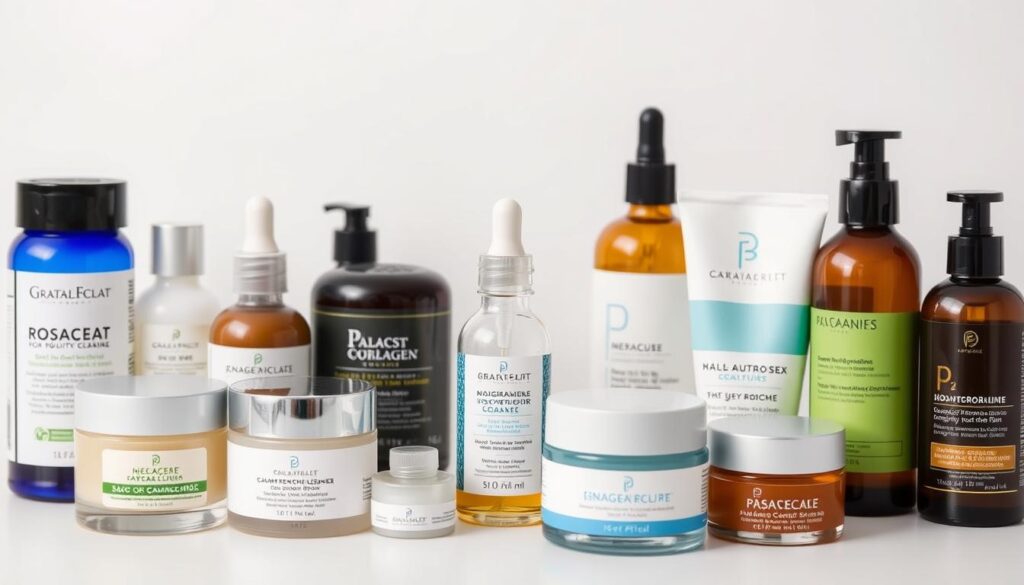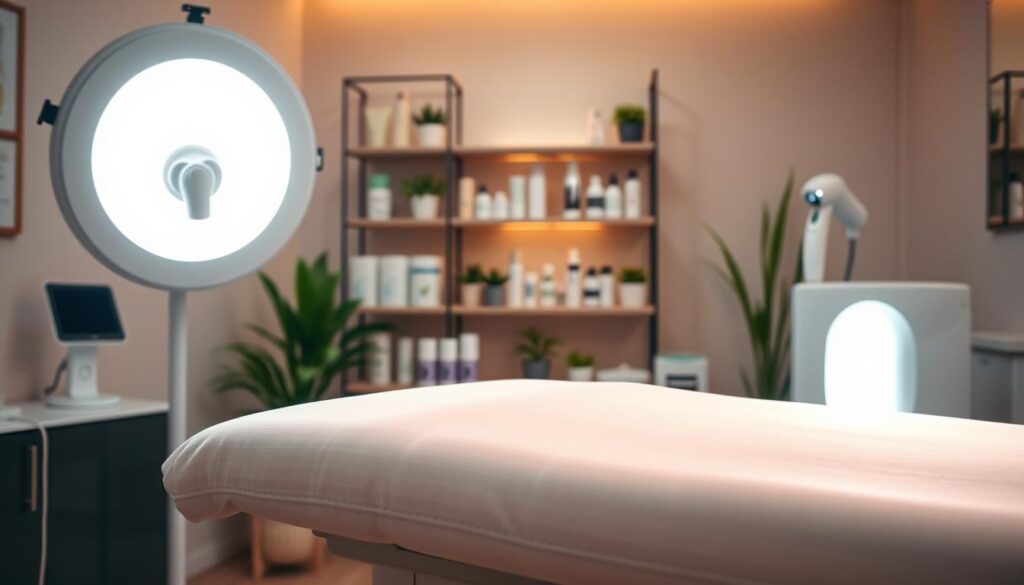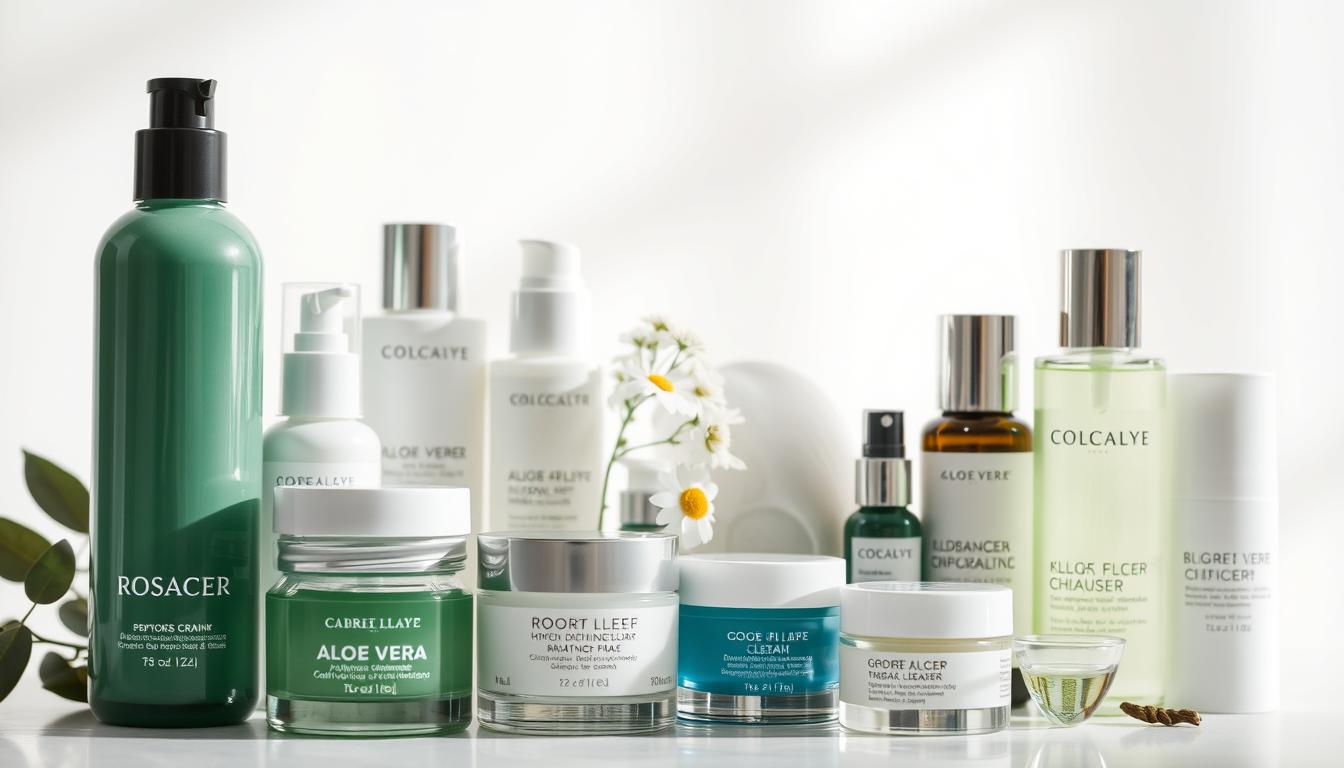Rosacea is a chronic inflammatory skin condition that affects millions worldwide. In Canada alone, over three million people live with it. It’s a significant health issue that needs attention and proper management.
If you’re dealing with rosacea symptoms like redness, irritation, and visible blood vessels, don’t worry. While there’s no cure, effective treatment and lifestyle changes can improve your skin’s health.
Understanding rosacea and its triggers is key to managing symptoms. This article will show you skincare tips and recommended products to help you manage your skin’s health.
Key Takeaways
- Rosacea is a chronic condition that requires ongoing management.
- Lifestyle changes can significantly impact rosacea symptoms.
- Proper skincare is essential for managing rosacea.
- Certain products can help alleviate rosacea symptoms.
- Understanding your skin’s triggers is key to managing rosacea.
Understanding Rosacea and Its Symptoms
If you’re dealing with rosacea, knowing its symptoms and triggers is key. Rosacea is a complex skin condition that affects people differently.
What Is Rosacea?
Rosacea is a chronic skin condition with inflammation and visible blood vessels on the face. It can cause mild redness or severe acne-like lesions.
Key characteristics of rosacea include:
- Facial redness
- Visible blood vessels
- Acne-like symptoms
- Eye irritation
Common Symptoms of Rosacea
Rosacea symptoms vary from person to person. Common signs include:
| Symptom | Description |
|---|---|
| Flushing | Temporary redness of the face |
| Persistent Redness | Long-term redness that doesn’t fade |
| Bumps and Pustules | Acne-like symptoms that can be painful |
Dr. Jane Smith, a dermatologist, says, “Understanding symptoms is the first step to managing rosacea.”
“Rosacea is a multifactorial condition that requires a complete treatment plan.” – Dr. Jane Smith
Triggers That Worsen Rosacea
Knowing and avoiding triggers is vital for managing rosacea. Common triggers include:
- Sun exposure
- Spicy foods
- Stress
- Extreme temperatures
By knowing what triggers your rosacea, you can reduce flare-ups and manage symptoms better.
Importance of a Gentle Skincare Routine
Having a gentle skincare routine is key for managing rosacea. Rosacea-prone skin needs gentle care to avoid irritation. Focus on gentle cleansing and moisturizing to soothe and protect your skin.
Daily Cleansing Tips
Cleansing daily is important, but do it gently to keep natural oils. Use a mild, fragrance-free cleanser made for sensitive skin. Clean your face with lukewarm water and gentle circular motions with your fingertips. Stay away from harsh scrubbers or exfoliants that can irritate your skin.
- Choose a cleanser that is labeled as suitable for rosacea or sensitive skin.
- Limit your cleansing to twice a day, unless you have makeup or sunscreen to remove.
- Pat dry your face with a clean towel; do not rub.
Moisturizing Essentials
Moisturizing is vital, even more so for rosacea-prone skin. It keeps moisture in, reduces redness, and guards against environmental irritants. Opt for a fragrance-free, hypoallergenic moisturizer. For more on managing rosacea, check out rosacea treatment resources.
Key moisturizing tips:
- Apply moisturizer while your skin is damp to help it absorb better.
- Choose a moisturizer with soothing ingredients like aloe vera or green tea.
- Reapply moisturizer throughout the day, after washing your face.
By following these gentle skincare steps, you can manage rosacea better. This will improve your skin’s health and look.
Best Ingredients for Rosacea-Prone Skin
Choosing the right skincare for rosacea is key. Look for ingredients that are gentle yet effective. They should help calm and reduce symptoms.
Anti-Inflammatory Ingredients
Anti-inflammatory ingredients are vital for rosacea. They reduce redness and irritation, making skin healthier. Here are some top picks:
- Green Tea Extract: It soothes irritated skin.
- Aloe Vera: It’s anti-inflammatory and moisturizing, great for rosacea.
- Licorice Extract: It reduces inflammation and aids in skin healing.
Avoiding Irritating Components
Knowing which ingredients to avoid is just as important. Some can make rosacea worse. Stay away from:
- Alcohol: It can dry out the skin, causing more irritation.
- Fragrances: Artificial scents can trigger allergic reactions and irritate sensitive skin.
- Harsh Exfoliants: AHAs and BHAs can be too rough for rosacea-prone skin if not used carefully.
By choosing anti-inflammatory ingredients and avoiding irritants, you can manage rosacea better. Always test new products and talk to a dermatologist if unsure.
Recommended Skincare Products for Rosacea
The National Rosacea Society says the right skincare is key for rosacea. It’s important to pick products that are gentle yet effective. This helps reduce flare-ups and keeps the skin healthy.

Cleansers for Sensitive Skin
Choosing the right cleanser is vital for rosacea-prone skin. Opt for a gentle, non-foaming cleanser that preserves natural oils. Look for products with the National Rosacea Society’s Seal of Acceptance. These are tested to be gentle and non-irritating.
Cetaphil Gentle Skin Cleanser is a top pick for sensitive skin. It’s fragrance-free and free from harsh ingredients that can irritate rosacea-prone skin.
- Gentle, non-irritating formula
- Fragrance-free to minimize irritation
- Non-comedogenic to prevent clogged pores
Best Moisturizers for Rosacea
Moisturizing is key for rosacea management. It soothes and protects the skin. Choose fragrance-free and hypoallergenic moisturizers to avoid irritation.
La Roche-Posay Toleriane Ultra Fluid is great for rosacea-prone skin. It’s lightweight, oil-free, and has ingredients that reduce redness and irritation.
When picking a moisturizer for rosacea, look for:
- Soothing ingredients like aloe vera or green tea
- Hydrating properties to maintain the skin’s barrier function
- SPF protection to prevent sun-induced flare-ups
By choosing the right cleanser and moisturizer, you can reduce rosacea flare-ups. This helps keep your skin healthier and more comfortable.
Sun Protection Strategies
Sun exposure can make rosacea worse. It’s key to protect your skin from the sun. By using good sun protection, you can lessen rosacea symptoms.
SPF Recommendations for Sensitive Skin
Choosing the right SPF is important for sun protection. For sensitive skin, use a broad-spectrum sunscreen with at least SPF 30. This guards against UVA and UVB rays that can cause rosacea.
Look for sunscreens that are safe for sensitive skin. They are less likely to irritate your skin.
Key considerations for SPF:
- SPF 30 or higher for adequate protection
- Broad-spectrum protection against UVA and UVB
- Choose products labeled for sensitive skin
Importance of Physical vs. Chemical Sunscreens
Sunscreens are either physical (mineral) or chemical. Physical sunscreens reflect UV rays using zinc oxide and titanium dioxide. They are better for sensitive skin because they don’t irritate as much.
Chemical sunscreens absorb UV rays and turn them into heat. They are easier to apply but might irritate some people with rosacea.
When picking between physical and chemical sunscreens, think about your skin’s sensitivity. For rosacea-prone skin, start with a physical sunscreen. It’s gentle and protective.
Lifestyle Changes to Manage Rosacea
Making certain lifestyle changes can help control rosacea. By choosing the right foods and managing stress, you can lessen rosacea symptoms. This can make a big difference in how often and how bad the symptoms are.
Dietary Adjustments
Your diet greatly affects rosacea. Some foods can make symptoms worse, while others can help. Here are some dietary changes to consider:
- Avoid foods that can trigger rosacea, like spicy dishes, hot drinks, and foods high in histamine.
- Eat more foods rich in omega-3 fatty acids, like salmon and sardines, to reduce inflammation.
- Drink lots of water to stay hydrated.
For more tips on diet and rosacea, check out the American Academy of Dermatology’s guide on preventing rosacea.
Stress Management Techniques
Stress can make rosacea symptoms worse. Using stress management techniques can help control symptoms. Here are some strategies:
- Try relaxation methods like deep breathing, meditation, or yoga.
- Regular exercise can help reduce stress and improve your mood.
- Make sure to get enough sleep each night to help your skin and body recover.
By adding these lifestyle changes to your daily routine, you can improve your best skincare routine for rosacea and your rosacea treatment options.
Makeup Tips for Rosacea
Makeup can help manage rosacea’s look if you choose the right products. Look for makeup made for sensitive skin or rosacea. These are gentler on your skin.
Choosing the Right Foundation
Finding the right foundation is key to covering rosacea. Choose ones that are fragrance-free and hypoallergenic. This reduces the chance of skin irritation.
Opt for foundations with soothing ingredients like green tea or chamomile. They can calm your skin.
Apply foundation gently with your fingers or a soft brush. This avoids rubbing and irritation. It helps for even coverage.
Color-Correcting Products
Color-correcting products are great for reducing rosacea’s redness. Green products are best as they neutralize red tones. Apply a small amount to affected areas before foundation.
Blend the color corrector well to avoid lines or patches. Then, apply your regular foundation for a natural look.
Using these makeup tips daily can help manage rosacea. It also enhances your skin’s natural beauty.
Professional Treatments for Rosacea
Managing rosacea often needs more than just skincare. Professional treatments are key for some. Over-the-counter products and lifestyle changes might not be enough.
Professional treatments aim to lessen symptoms, reduce flare-ups, and boost skin health. Laser therapy and topical prescription medications are among the most effective.
Laser Therapy Options
Laser therapy is a top choice for rosacea, focusing on reducing redness and blood vessels. Laser treatments target affected areas, making them less visible and easing symptoms.
- Pulsed Dye Lasers: Great for cutting down redness and flushing.
- ND:YAG Lasers: Hits deeper blood vessels, making them less noticeable.
- IPL (Intense Pulsed Light): Enhances skin tone and lessens rosacea symptoms.
A study in the Journal of Clinical and Aesthetic Dermatology shows laser therapy’s benefits. It significantly improves rosacea symptoms, the study found.
“Laser therapy has emerged as a valuable treatment option for patients with rosacea, reducing erythema and telangiectasias.”
Topical Prescription Medications
Topical prescription medications are also effective for rosacea. They’re often used when over-the-counter products don’t work.
| Medication | Use | Benefits |
|---|---|---|
| Metronidazole | Reduces inflammation | Works well against papules and pustules |
| Azelaic Acid | Antimicrobial and anti-inflammatory | Helps reduce redness and bumps |
| Ivermectin | Anti-parasitic and anti-inflammatory | Targets rosacea symptoms and Demodex mites |
Seeing a dermatologist is key to finding the right treatment. They can guide you through options and tailor a treatment plan.

Adding professional treatments to your rosacea care can better control symptoms. This leads to healthier, more comfortable skin.
Common Myths About Rosacea
Many people have wrong ideas about rosacea. It’s important to know what’s true and what’s not. Rosacea is a skin condition that affects many, and knowing the facts helps manage it better.
Debunking Misconceptions
One myth is that rosacea comes from poor hygiene. But, it’s really caused by genetics, environment, and hormones. Even people with great skincare can get rosacea.
Let’s debunk some common myths:
- Myth: Rosacea is contagious. Reality: Rosacea can’t be spread through touch.
- Myth: Rosacea only affects older adults. Reality: It can hit anyone, even kids.
- Myth: Rosacea is just a result of sensitive skin. Reality: It’s a unique condition needing special care.
Understanding the Reality of Treatment
Treating rosacea needs a mix of gentle skincare, avoiding triggers, and sometimes, doctor visits. Seeing a dermatologist is a good first step to get a treatment plan.
For skincare for rosacea, use soft, scent-free products. Look for ones made for sensitive or rosacea-prone skin. Aloe vera and green tea can help calm your skin.
Rosacea treatment options vary a lot. What works for one might not work for another. Be patient and work with your dermatologist to find the best treatments for you.
Learning about rosacea and its treatments is a big step towards managing it. Stay informed, be patient, and always ask for professional advice when needed.
When to See a Dermatologist
If you’re finding it hard to control your rosacea symptoms, it’s time to get expert advice. A good skincare routine can help, but some signs mean you need a dermatologist’s help.
Identifying Signs for Professional Help
Look out for signs like persistent redness, intense burning, or visible blood vessels. If your symptoms get worse or don’t get better with skincare, see a dermatologist.
Preparing for Your Dermatologist Visit
When you visit, your dermatologist will check your skin, talk about your symptoms, and suggest treatments. Tell them about your skincare routine and any lifestyle factors that might be affecting your rosacea.
Getting professional help can help you manage rosacea better and improve your daily life.
FAQ
What is rosacea and how is it triggered?
Rosacea is a long-term skin issue that causes inflammation, redness, and visible blood vessels. It can be set off by things like sun exposure, stress, certain foods, and harsh skincare products.
How can I manage rosacea flare-ups?
To handle rosacea flare-ups, use a gentle skincare routine. Avoid triggers and use soothing products with anti-inflammatory ingredients. Making lifestyle changes, like diet adjustments and stress management, can also help.
What skincare products are suitable for rosacea-prone skin?
Choose gentle, fragrance-free cleansers and moisturizers for sensitive skin. Ingredients like green tea, aloe vera, and niacinamide can help soothe and protect your skin.
How important is sun protection for rosacea-prone skin?
Sun protection is key for rosacea-prone skin. UV rays can make symptoms worse. Use a broad-spectrum sunscreen with at least SPF 30. Physical sunscreens with zinc oxide or titanium dioxide offer better protection.
Can makeup worsen rosacea symptoms?
Makeup can make rosacea symptoms worse if not chosen carefully. Choose gentle, fragrance-free products. Look for color-correcting products to neutralize redness. Always remove makeup gently and thoroughly.
Are there any professional treatments available for rosacea?
Yes, there are professional treatments for rosacea. These include laser therapy, intense pulsed light (IPL) therapy, and topical prescription medications. A dermatologist can help find the best treatment for you.
How can I choose the right dermatologist for my rosacea treatment?
Look for a dermatologist with experience in treating rosacea. Check their qualifications, read reviews, and ask for referrals. A good dermatologist will create a treatment plan tailored to your needs.
What lifestyle changes can help manage rosacea?
Along with a gentle skincare routine, making lifestyle changes can help. This includes dietary adjustments, stress management, and avoiding triggers. Keeping a symptom journal can help you identify patterns and make better lifestyle choices.

